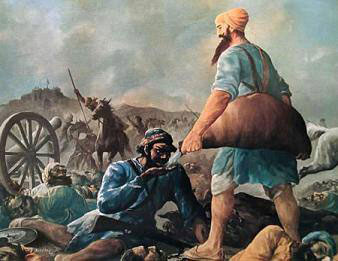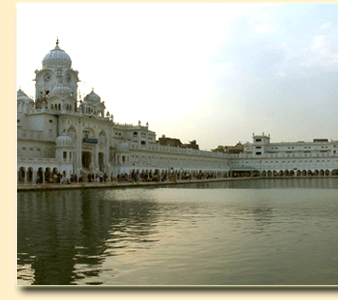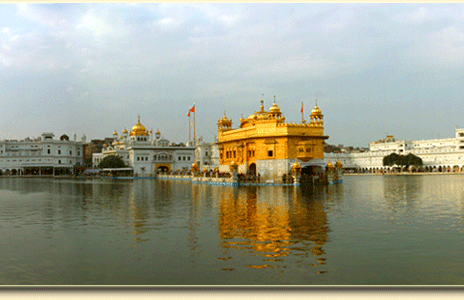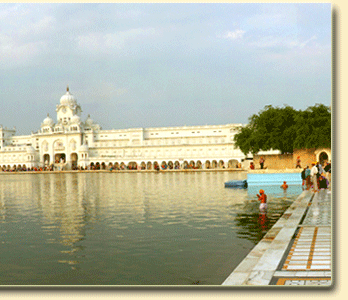The founder of the Sikh religion was Guru Nanak who was born in 1469. He preached a message of love and understanding and criticized the blind rituals of the Hindus and Muslims. Guru Nanak passed on his enlightened leadership of this new religion to nine successive Gurus. The final living Guru, Guru Gobind Singh died in 1708.
During his lifetime Guru Gobind Singh established the Khalsa order (meaning 'The Pure'), soldier-saints. The Khalsa uphold the highest Sikh virtues of commitment, dedication and a social conscious. The Khalsa are men and women who have undergone the Sikh baptism ceremony and who strictly follow the Sikh Code of Conduct and Conventions and wear the prescribed physical articles of the faith. One of the more noticeable being the uncut hair (required to be covered with a turban for men) and the Kirpan (ceremonial sword).
Before his death in 1708 Guru Gobind Singh declared that the Sikhs no longer needed a living and appointed his spiritual successor as Sri Guru Granth Sahib, his physical successor as the Khalsa. Guru Gobind Singh felt that all the wisdom needed by Sikhs for spiritual guidance in their daily lives could be found in Sri Guru Granth Sahib, the Eternal Guru of the Sikhs. Sri Guru Granth Sahib is unique in the world of religious scriptures because not only is it accorded the status of being the spiritual head of the Sikh religion, but besides the poetry of the Gurus, it also contains the writings of saints of other faiths whose thoughts were consistent with those of the Sikh Gurus. |
Bhai Kanhayya was a true Sikh of the Guru Gobind Singh, he did not make any distinction between the friend and the foe. After the battle some of the Sikh warriors complained to the Guru about Bhai Kanhayya's work. They said, "Look, dear Guru, here is a Sikh who was helping the enemy. He is a simpleton who does not make any distinction between our soldiers and that of the enemy. Would you please ask him to explain his behavior?"
The Guru showed a little surprise and called Bhai Kanhayya to his side. He asked him if it was true that he offered water to the enemy.
"Yes, my Lord, it is true," replied Bhai Kanhayya, the water carrier.
"Why did you do that?" asked the Guru.
"For me, O Master, there were no friends and no foes. Their faces were all the same for me. Moreover, you always tell us to sing - 'None is my enemy, none a stranger. All human beings are my friends.'"
"Well done, Bhai Kanhayya, you acted like a true Sikh," said the Guru. "It is the foremost duty of a Sikh to help the needy and to relieve the sufferings of people without any prejudice whatsoever." Saying this Guru at once sent another Sikh to fetch a box of ointment from his dispensary. The Sikh brought one without delay. The Guru handed over the box to Bhai Kanhayya and said "Bhai Kanhayya, remember, when you give water to the wounded, also apply this ointment to their wounds. By doing so you will be acting as a true Sikh of mine". |
 |








